What to Know About Skin and Hormones

Most women know that hormone imbalances can affect the way they feel because they’ve felt the impact at different points in their menstrual cycles. We put on the brave face of a woman warrior and go about our daily lives, pushing through the symptoms.
Without you realizing it, your hormone issues could also be affecting the way you look, no matter how well you’ve mastered the “everything’s fine” smile. Hormones trigger reactions in every part of your body, and that includes your skin.
The first step to taking care of your hormones to feel better and look better is understanding what’s happening in your body. Let’s start with the most notable and proven connections between your skin and hormones.
Acne
There are many factors that affect acne and breakouts, but hormones play a major role. When you have high androgen levels, your skin produces more of its natural oil, called sebum. That extra sebum can clog your pores and lead to blemishes.
Unfortunately, too many people who have acne try to fix it by using harsh soaps and cleansers to get rid of their sebum. If you go too far, your body will produce even more sebum to make up for it. The better solution is to cut to the chase and find strategies to control your androgen hormones.
Healing and Scarring
The body’s healing process is amazing, but it needs the right tools to get the job done. One hormone that has a serious impact on your wound healing is estrogen.
As far as your skin goes, when you have low estrogen, injuries heal more slowly which means you’re more prone to scarring. If you happen to have high androgens causing acne, low estrogen means that acne is more likely to leave scars behind.
Aging
Do you know any women who seemed to look miraculously young until they hit menopause, and then it was as if all the years caught up to them at once? This is a common complaint among women, and it comes from low estrogen.
Estrogen protects your body for the aging effects of sun exposure. If your estrogen is low, past years of sunning may show up in the form of sagging skin, wrinkles, and age spots. While this is most visible during menopause, women with lower estrogen at any age are more likely to look older.
Dryness
When your skin is well-hydrated, it has more to do with the skin’s ability to hold moisture than with the amount of moisture it’s getting. You need both, but if your skin can’t hold water, you’ll have dry skin no matter how much you hydrate and nourish it.
Estrogen helps your skin hold water. When you don’t have as much estrogen as you should, that water barrier breaks down and your skin becomes dry, itchy, and flaky.
Saving Your Hyde By Learning About Skin and Hormones
Far too many women try to improve their skin by spending hundreds on pricey skin care products and professional cosmetic treatments. If you don’t take care of the underlying hormonal causes, though, you’re just bailing water out of a boat that still has a hole.
Instead, get to the bottom of the connection between your skin and hormones. Learn how to balance your hormones naturally with our online course.
I want to hear from you!
- Was this post useful? Have you been dealing with any menstrual and/or reproductive issues? Maybe vitamin D deficiency is the culprit. Tell me below what you’re dealing with and how you are fixing it. Shoot me an email and leave a comment! [email protected]
- What I would love for you to do is to share this post on social media or with any woman who might need this information.
- Let’s get social! Join me on Instagram and Facebook for all the latest info on periods, hormones, and of course a glimpse into my life and what I’m up to on the daily.
Want even more hormone and period lovin’ content?
- Want to be the first to know when I release a new blog post? I get super deep and functional in my blog posts – you won’t wanna miss them! Sign up below!
- Ready to understand the "why" behind your PMS - want to become your own health advocate and massively uplevel your period game? GET my new course How TO Beat PMS here
Medical Disclaimer
Information in this post and on this web site is provided for informational purposes only. The information is a result of practice experience and research by the author. This information is not intended as a substitute for the advice provided by your physician or other healthcare professional or any information contained on or in any product label or packaging. Do not use the information on this web site for diagnosing or treating a health problem or disease, or prescribing medication or other treatment. Information and statements regarding dietary supplements have not been evaluated by the Food and Drug Administration and are not intended to diagnose, treat, cure, or prevent any disease. Always speak with your physician or other healthcare professional before taking any medication or nutritional, herbal or homeopathic supplement, or using any treatment for a health problem.
